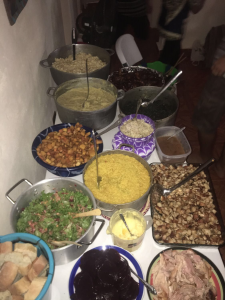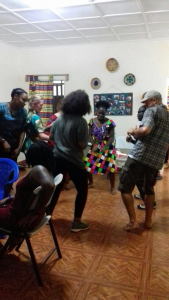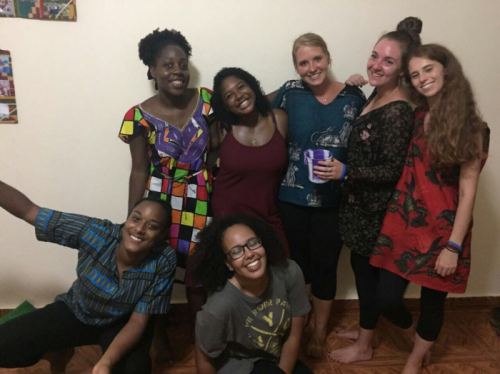November and December is the holiday season. Thanksgiving, Christmas and New Year’s, all a time when we reflect with our family and friends about the all that we have witnessed and endured throughout the year. We express gratitude for surviving our hardships and solidarity in our mistakes.
Last year, I celebrated Thanksgiving at one of my siblings’ houses. Of course, we decided it was a great idea to go out the night before, so when we woke, we had much work ahead of us. Thanksgiving morning started with the smell of crisp autumn breeze mixed with winter’s frigid bitterness, and like most American families, we watched Macy’s Thanksgiving Parade on silent, and blasted our favorite bachata, salsa, and hip-hop music, as we rushed to tidy and finish cooking before everyone arrived at the house for dinner. Luckily, we had the easiest part of dinner preparation: dinner set-up and the other dishes.
After the cleaning was finished, we sought to move the furniture to make sure everyone had a place our three connected dinner  tables. Neatly we placed the burnt orange autumn leaved table cloth across the tables and place settings for each guest. After that, we were able to focus on the menu and boy was I nothing less than impressed. We cooked garlic butter baked salmon and steamed crab legs, fried chicken, fresh green beans, glazed sweet potatoes, baked macaroni and cheese, arroz con guandules (yellow Spanish rice and beans), chicken empanadas, fresh cranberry sauce, salad, pastelon (sweet plantain lasagna), and plethora of other multicultural dishes. I’m getting hungry just thinking about it. The turkey arrived with our dinner guests and it was all fun from there. We ate dinner, danced, and played games until we finally decided to go to bed.
tables. Neatly we placed the burnt orange autumn leaved table cloth across the tables and place settings for each guest. After that, we were able to focus on the menu and boy was I nothing less than impressed. We cooked garlic butter baked salmon and steamed crab legs, fried chicken, fresh green beans, glazed sweet potatoes, baked macaroni and cheese, arroz con guandules (yellow Spanish rice and beans), chicken empanadas, fresh cranberry sauce, salad, pastelon (sweet plantain lasagna), and plethora of other multicultural dishes. I’m getting hungry just thinking about it. The turkey arrived with our dinner guests and it was all fun from there. We ate dinner, danced, and played games until we finally decided to go to bed.
This year was one of the first years that I will be spending in the absence of my closest friends and family. Although, I decided it was best to stay in my service country for the holidays, in the back of my mind I couldn’t help but think how stupid of an idea that was. The thought of not playing endless hours of Monopoly or stuffing myself with tons of good food, driving through local neighborhoods that already have Christmas light up, or going to my local hangout spot with friends chatting, dancing, and having a good time the night before the “Thanksgiving throw down”. After the past few months of difficulty I have experienced in Liberia, I was ready to count out this year’s holidays as enjoyable because I wouldn’t be at home.
The great thing about living in Liberia is that the feeling of home, that I have mentioned in my previous blog posts and that some of my colleagues have also mentioned, is never too far away, if you know where to look. Just because you aren’t spending time with family, doesn’t mean that you will be spending it alone.
My actual Thanksgiving Day, was like any other normal teaching day. I went to class and of, course there was an impromptu campus meeting that cut my teaching time in half. So instead of taking my students to the lab like I originally intended, we finished our notes on ruminant digestion and to have a little review fun, I asked my students to make a song that would help them remember the process for ruminant digestion. I was so pleased at the creative songs that my student came up with. I left class with my heart cup full of appreciation and gratitude for the students that I have been privileged to teach for the past four months. After my class, I went home and gardened, spoke to my family about their Thanksgiving plans and waited foe Friendsgiving Friday, when the real fun would begin.
 I have been fortunate to be in a county where lots of wonderful expats and Peace Corps volunteers work and this year, I had the privilege of spending Friendsgiving with them. One of the Peace Corps volunteers took it upon herself to organized Friendsgiving, since most of us were working on actual Thanksgiving Day. (FYI, Liberians do celebrate Thanksgiving, but it’s in the beginning of November and usually consist of a few days of going to church and praying all day). I won’t bore you with all the minute details of that 25-person extraneous meal prep in coal pots, gas stoves, and outdoor ovens, but it was a task and a half.
I have been fortunate to be in a county where lots of wonderful expats and Peace Corps volunteers work and this year, I had the privilege of spending Friendsgiving with them. One of the Peace Corps volunteers took it upon herself to organized Friendsgiving, since most of us were working on actual Thanksgiving Day. (FYI, Liberians do celebrate Thanksgiving, but it’s in the beginning of November and usually consist of a few days of going to church and praying all day). I won’t bore you with all the minute details of that 25-person extraneous meal prep in coal pots, gas stoves, and outdoor ovens, but it was a task and a half.
When the last volunteers arrived, and the food was prepared, we gathered around and introduced ourselves. It was so nice to see all the faces of all those whom with I was close, the ones whom I knew of through group chats and work-related emails, and those who I had yet to meet. Every person, from somewhere different and heart full, ready to spend the day feasting with strangers. It was absolutely wonderful to get to meet with others, talk about our goals for our service and aspirations after, talk about the struggles and wonders of our community and laugh.
I could go on about how wonderful this years Friendsgiving was, and how wonderful the following day trip to a hotel pool was also amazing but I won’t bore you. But what, I wanted you to take out of this, is that home is truly what you make it. Home doesn’t always have to be a physical person, place, or thing in which you identify with. For me, home is where I am and where I am welcomed. So this year, even though I am 4,560 miles away from where I would call home (but, who’s counting), home is eating garlic butter potato greens, sipping homemade pineapple wine and looking out in the distance of palm trees and banana leaves.
This year, home was Liberia.
Sayvanna Sfabian received a bachelors degree in Animal Science from New York State College, Cobleskill and a masters in Agricultural Education from Cornell University. Before becoming an AgriCorps Fellow, Sayvanna spent several summers working on her family’s farm in the Dominican Republic.


